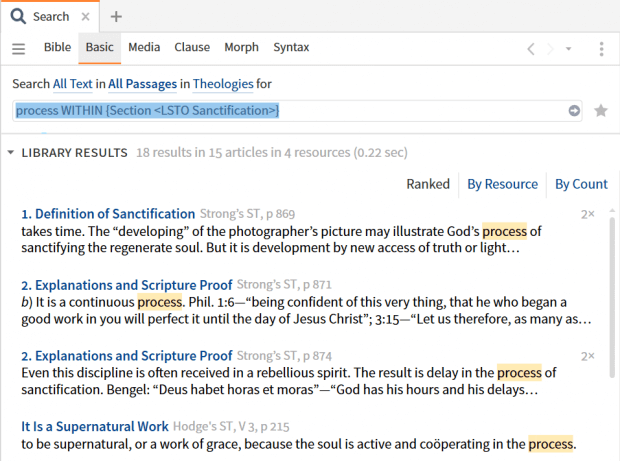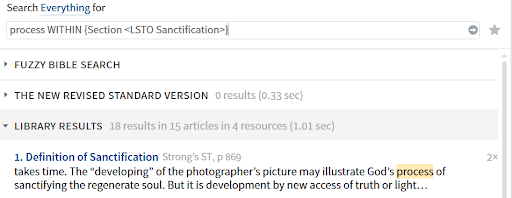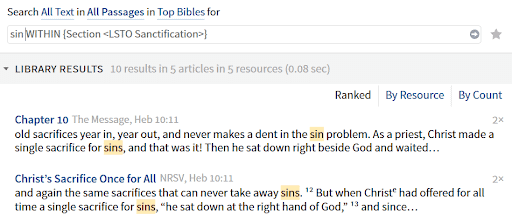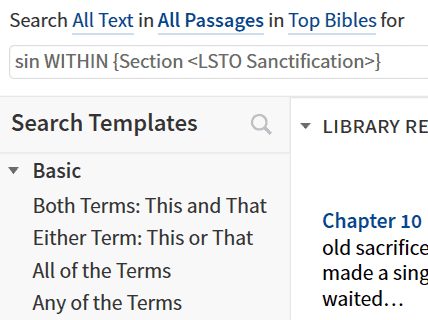In a previous post, I discussed the Theology Guide and the associated resource, the Lexham Survey of Theology (LST). In this post, I’ll dive into the Lexham Systematic Theology Ontology (LSTO), which is the information structure under the hood of the LST.
As I discussed previously, Logos has annotated spans within five systematic theologies (Berkhof, Packer, Ryrie, Hodge, and Strong) to correspond with the 234 topics discussed in the LST, and it has done so with the LSTO.
Notice that I’ve used the word “spans” to describe how the systematic theologies have been annotated. The important benefit to this method is that you can search within the spans.
For example, if you want to find any references to sanctification as a process within your systematic theologies, you can search for the word “process” within the “Sanctification” section of the LSTO using the following search: process WITHIN {Section <LSTO Sanctification>}.
The example above has limited the results to hits within my Library (particularly a collection I’ve made in my four Theologies, most of which have not yet received LSTO annotations), but you can also accomplish this with an Everything or Basic search. As with all power-user searches, the operators are case-sensitive and need to be typed as you see here.
This is a powerful tool for several reasons:
- This search will save you time since you can have Logos skim through the relevant sections of your systematic theologies for the words you’re looking for, rather than opening each resource for yourself.Now, this search will only reveal the words you enter, not their synonyms, but you can add additional operators to your search to find multiple terms. Using the example above, I’m trying to find references to sanctification as a process occurring gradually over time rather than as an instantaneous event occurring all at once. So, I can add more terms to the first half of the search, so that Logos will look for multiple terms: process OR gradual WITHIN {Section <LSTO Sanctification>}. If you want to run more complex searches like this, I would advise limiting your query to a collection.
- You can also run searches like this in the Bible of your choice.
This searches the text of the Key Verses flagged for each topic within the LST for your term. Since your theologies will likely use theological terminology, you may not be able to run the exact same search in your theologies and Bibles, but the mechanics are the same. - You can use all the available query syntax options to search the LSTO. Even if you’re not a power user, you can use the Logos Search Templates to build your query.
- Since there are currently more than 300 systematic theologies on offer in Logos, this search will become richer and more powerful as Logos annotates additional resources. If you already own a robust and ecumenical theological library, the resources you already own may eventually be enhanced with LSTO annotations, making their value increase seemingly overnight.
- Since the intention is to add LSTO annotations to systematic theologies representing a broad, ecumenical swath of the Christian tradition, this search may eventually reveal perspectives we have not yet encountered or considered. Though we may not agree with every author’s conclusions, we can appreciate and receive their wisdom and their devotion in the theological process. Encountering these new perspectives can enlarge our vision of the God we are all pursuing and enhance our appreciation of the diversity represented within the body of Christ.
Hopefully, you’ve caught a vision for the power and value of searching the LSTO. Now, go try it out for yourself!
And as I mentioned in a previous post, if you’d like to suggest systematic theologies that should be prioritized for future inclusion in the LSTO, consider joining Faithlife’s LST group.









